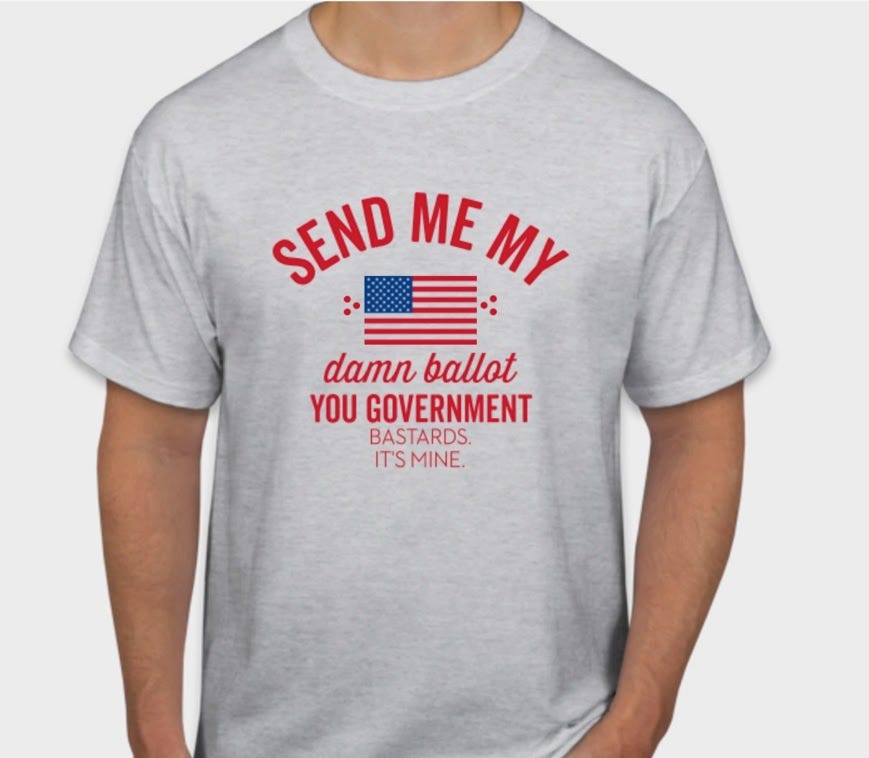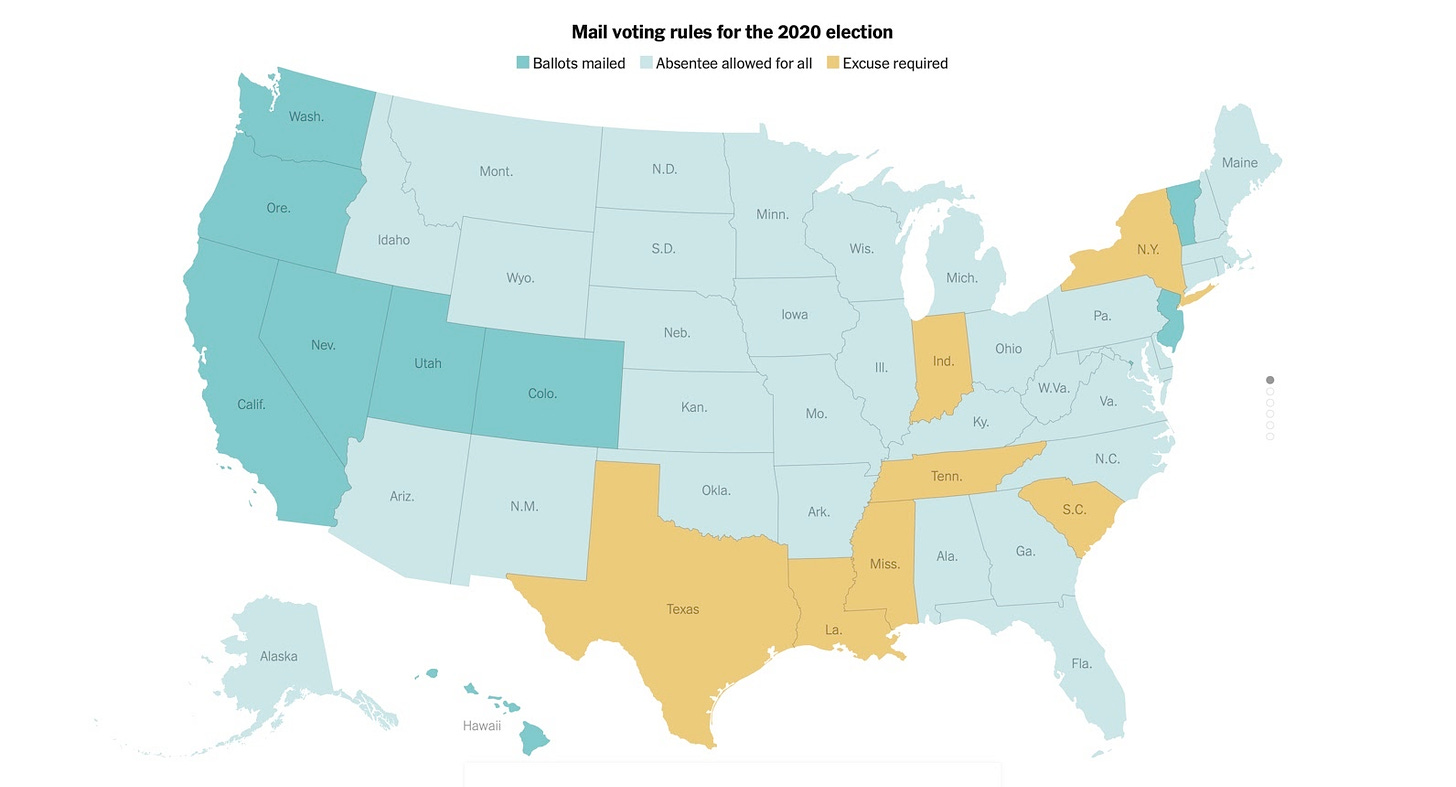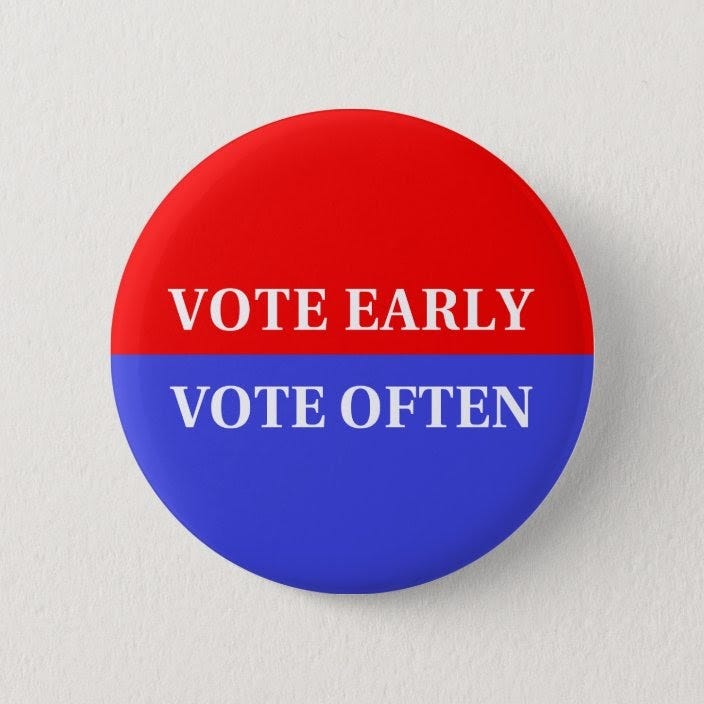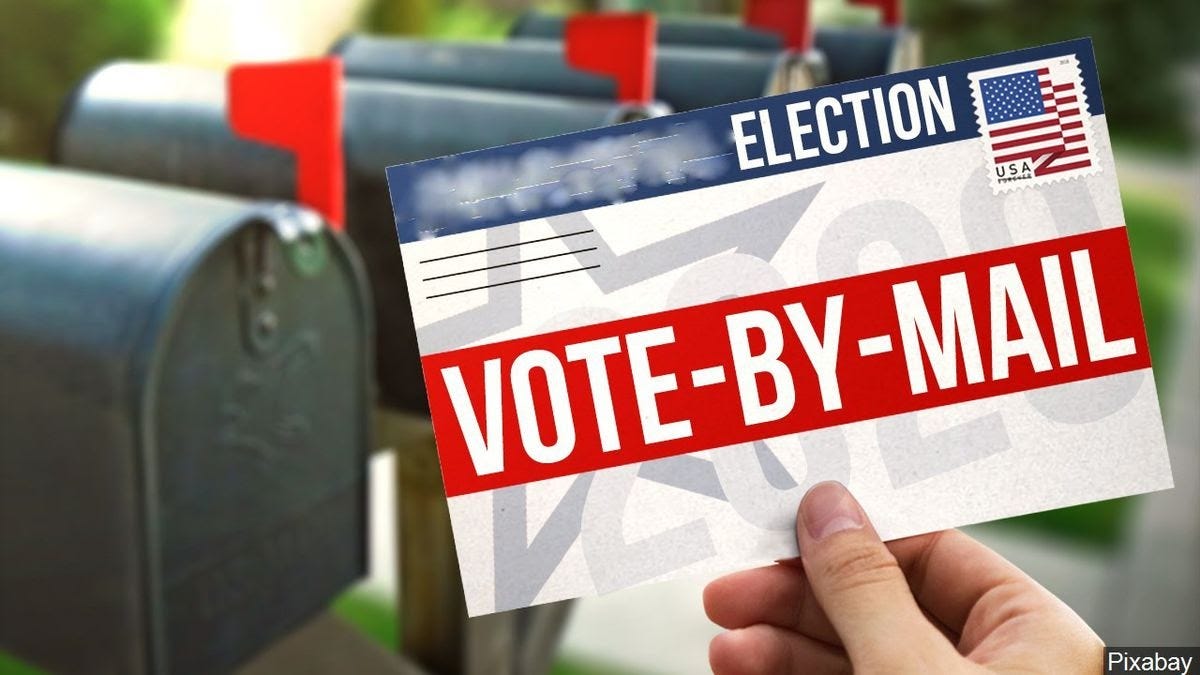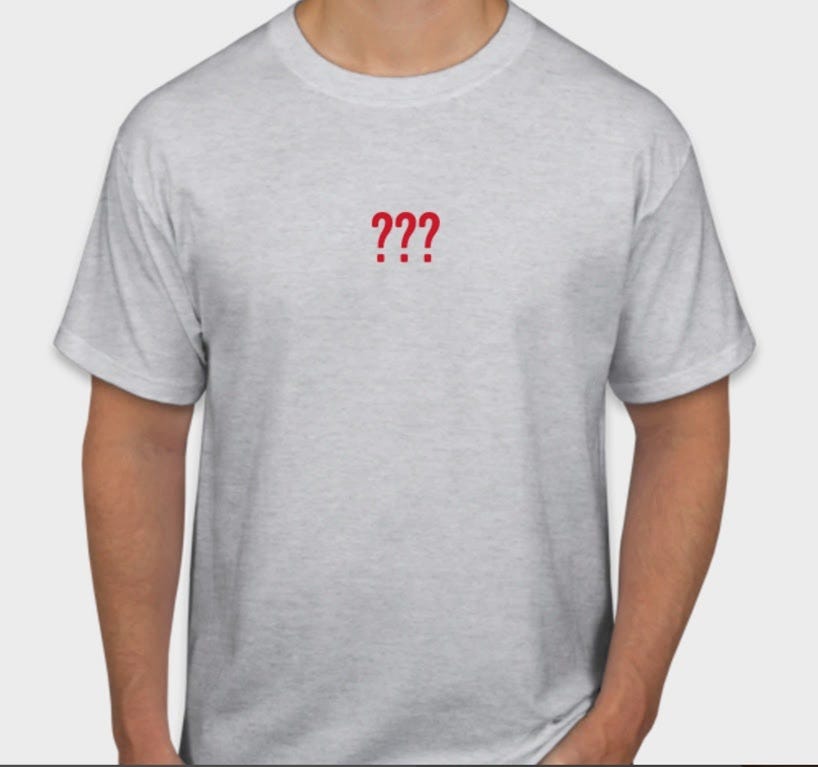Ruminating with PHIL KEISLING
The vote-by-mail pioneer explains the single most important voting rights reform.
I first became friends with Phil Keisling in the early 1980s when he and I were extremely low-paid editors ($8,400 a year!) of “The Washington Monthly,” a tiny but terrific moderate-left magazine about politics and government. Like many other journalists I revere (including Pulitzer Prize winners Katherine Boo, Taylor Branch and Jon Meacham), Phil and I are proteges of the legendary founder, Charlie Peters, one of the most influential magazine editors of the late 20th Century.
In the 1990s, Phil served as secretary of state of Oregon, where in 1998 the entire state began voting by mail. The “vote-at-home” system that Phil developed soon helped boost turnout dramatically and, according to the 2005 Carter-Baker Commission, served as a national model for safeguarding mailed-out, or so-called “absentee ballots.”
Phil went on to be the Johnny Appleseed of the vote-at-home movement. In recent years, Oregon has been joined by Washington, Colorado, Utah, and Hawaii in holding entire elections by mail –-that is, by automatically mailing all active registered voters their ballots. Voters then have the choice of returning them in the mail, or dropping them off in person.
Nationally, the portion of the electorate that voted with a mailed-out ballot went from 7.8 percent in 1996 to 46 percent in 2020. And in 2020, nine states and the District of Columbia—all blue except Utah—automatically sent ballots to their voters. This huge surge in mail ballot use was a big reason the 2020 election brought record turnout despite taking place during a pandemic.
It wasn’t long ago that it was Republican voters—think seniors, those traveling on business – who most took advantage of voting by absentee ballot. But Donald Trump turned vote-by-mail into a partisan issue—remember the attacks on the post office? Last November, two thirds of Trump supporters voted in person --and four-fifths of Biden supporters voted early or by mail.
Most of the hundreds of voter suppression bills introduced in 40 state legislatures aim to limit vote-by-mail. The overall threat to democracy that these bills (and in some states, now laws) present is catalogued and analyzed at the Brennan Center for Justice, Protect Democracy and Phil’s organization, which has zeroed in on the threat to vote-by-mail.
JON:
Hi, Phil.
I’m so sick of this Republican line about “ballot integrity.” Ever since 2001, when Karl Rove started pressuring U.S. Attorneys (and in some cases firing them) in a bogus effort to find vote fraud, these jokers have come up empty. That’s 20 years of lies about a problem that basically doesn’t exist.
PHIL KEISLING:
Voters don’t cast fraudulent ballots for the same reason counterfeiters don’t manufacture pennies. Why risk jail to fake one vote? It makes no sense and almost no one ever does it.
JON:
I grew up in Chicago politics, where the joke in the 1950s and 1960s was that the ward heelers in Mayor Daley’s machine urged their people to “vote early and often.” The dead told no tales but they did sometimes show up on Election Day. In Georgia in 1962, a county boss literally stuffed the ballot box in a failed effort to prevent Jimmy Carter from being elected to the state senate. But those days are long over. The irony is, the 2020 election may have been the cleanest in American history.
PHIL KEISLING:
That’s right, and vote-by-mail is generally cleaner because there’s less opportunity for mischief at the board of elections than in precincts. In recent years, states and counties have built in safeguards for these ballots.
JON:
As we saw in 2020, there’s a major correlation between automatically getting an absentee ballot and turnout. So then it’s likely that turnout will be down in 2022, right? And not just because there’s lower turnout in midterms.
PHIL KEISLING:
Before answering that, let’s rise above the treetops for a second. There are three main ways that people vote. You go some place in person. [either early to polling places or drop boxes or to vote on Election Day]. You apply for an absentee ballot, often months in advance, and you get it—in most cases—with no excuses necessary. But there’s a third way, pioneered in Oregon, where they just send the ballot to you automatically in the mail if you’re an active registered voter.
In 2020, states where absentee ballots were already “no excuse required,” or which made them more accessible because of Covid-19, saw increased turnout compared to 2016. But it wasn’t dramatic – and some “excuse required states” had similar increases in the 5-6 percent range.
“The irony is, the 2020 election may have been the cleanest in American history.”
The much bigger differences came in states in this third category -- where voters just receive the ballot automatically, no application required, period. I like to paraphrase Shakespeare: “To be required to apply, or not to be required to apply—that is the question.”
For example, New Jersey, Nevada, Vermont and Hawaii for the first time mailed ballots to all their voters – and saw gains in the double-digits.
And look at what happened in non-battleground New Jersey, among young registered voters, age 18-29. According to a study out of Tufts University, those voters cast ballots at a 67 percent rate—up 22 percent from their turnout rate in 2016.
JON:
Those are astonishing numbers for young voters, Phil, but now things in Republican-controlled states are moving in the wrong direction. And I’m scared by this ridiculous Arizona audit because it shows that Republicans will literally do anything—even throw in their lot with “Cyber Ninjas” conspiracy nuts who think bamboo splinters they’ve “found” prove that the Arizona ballots were corrupted in China.
I think there’s a decent chance that if these Banana Republicans win control of the House in 2022 and hold it in 2024—quite possible, by the way—they will refuse to certify the 2024 election if a Democrat wins. That would bring down the curtain on American democracy.
How scared are you?
PHIL KEISLING:
This is a long battle that has gone on for centuries. The reason I’m not as scared as other people is that we have elevated the conversation in ways that didn’t exist before. The involvement of organizations like ours and Major League Baseball and corporations is making a difference, too. Politicians working to suppress the vote aren’t doing this in the dark of night in back rooms; they’re being forced to do it in broad daylight, where they’re more likely to suffer real consequences.
“The key is to frame the issue very simply: Do you want to make it easier to vote—or harder?”
So while in the short term some important territory has been lost, most states now have highly motivated people fighting back. And even with the new law in Georgia, all voters still have options for “no excuse” voting with mailed out ballots that don’t exist at the moment in places like New Hampshire, or Delaware, where you still have to have an excuse to vote absentee.
JON:
This is not Jim Crow on steroids. Yes, it’s motivated by the same racism that powered poll taxes, grandfather clauses, literacy tests, “The Thirty Questions” (quizzes even a political science professor couldn’t answer) and the other unconstitutional crimes of Jim Crow that I learned more about researching Jimmy Carter’s life. But those Jim Crow voter suppression tactics reduced the number of black voters in some Southern counties literally to zero. That’s not what’s happening here. These new laws are the same in spirit, different in result, at least when it comes to suppression. When it comes to using politicized election boards and state legislatures to rig elections to favor Republicans, today’s danger is very real.

PHIL KEISLING:
These laws – so-called solutions desperately in search of a true problem -- are built on the Big Lie and myths about the 2020 election having been stolen. But if people mobilize around small “d” democracy—if the people who see it’s a rigged game educate themselves— there’s a good chance the lost territory can’t just be regained, but we can keep pushing forward to win new territory.
“To be required to apply, or not to be required to apply—that is the question.”
JON:
To make progress both at the state level and to build support nationally for HR1/S1—the For the People Act—it seems to me the key is to frame the issue very simply: Do you want to make it easier to vote—or harder? Every time they appear on TV, Republicans should be asked: “Why do you want to make it harder to vote?”
This obviously won’t solve the problem, but it will at least frame the question properly. The good news is that while polls show that most Americans think some kind of ID makes sense—a possible area for concession and compromise—the vast majority want easy, no-excuses vote-by-mail, early voting and professionals—not ideologues—running elections.
PHIL KEISLING:
And the backlash against voter suppression may prove more powerful than the temporary gains the voter suppression people think they’ve got.
JON:
Yep. I remember in 2012 when there was a lot of voter suppression in Pennsylvania and the Romney people were talking about a “white wave” there that would win it for him. I called Mayor Michael Nutter of Philadelphia and asked him about it. He said something like, “There’s a wave coming, all right. It’s a black wave and it will sweep in Obama again.”
Nutter was right. If you try to take away something their parents and grandparents fought and died for, you’re going to pay the price. If voters are really angry about this in the midterms, they might stand in line for three hours and defy the historical norm, which would be Republican gains.
PHIL KEISLING:
There’s a much better solution than waiting in line—apply for your mail-in ballot as soon as you can. But you shouldn’t have to. If I had to put the slogan I’ve been thinking about on a tee-shirt, it would be, “Send me my damn ballot, you government bastards. It’s mine.”
OK, so it needs a little refinement. Maybe you and your readers can do better.
JON:
Thanks, Phil.
Contest for the Old Goats community!
What would you put on YOUR t-shirt? Can you “do better?” Let me know in the comments what your message would be. The best* answer will receive a real t-shirt with their winning custom answer!
*Best is determined by Old Goats editor and all results are final




